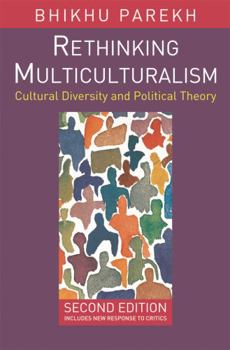Rethinking Multiculturalism: Cultural Diversity and Political Theory
Select Format
Select Condition 
Book Overview
Bhikhu Parekh argues for a pluralist perspective on cultural diversity. Writing from both within the liberal tradition and outside of it as a critic, he challenges what he calls the moral monism of... This description may be from another edition of this product.
Format:Paperback
Language:English
ISBN:1403944539
ISBN13:9781403944535
Release Date:October 2005
Publisher:Red Globe Press
Length:432 Pages
Weight:1.40 lbs.
Dimensions:0.9" x 6.3" x 9.2"
Customer Reviews
3 ratings
Transforming cultural diversity into wealth by dialogue
Published by Thriftbooks.com User , 18 years ago
Multicultural societies face a formidable political task to turn racial, religious and tribal differences into strength. The problems in Iraq, Sudan, Nigeria, India, Indonesia, Bolivia, Peru, Venezuela, Guatemala, Northern Ireland, the former Yugoslavia, the former USSR, problems with immigrants, in France, the UK are well known. Even the USA and Canada have serious discrimination problems. According to Parekh no country has been totally successful in establishing a harmonious multi-cultural society. This book is excellent when it comes to examining the causes of this failure and what to do about it. The book deals with this issue from a country point of view. It is also relevant for business as failure greatly slows down or even makes economic progress impossible e.g. Iraq and Nigeria. One very important positive development is that several successful global companies, like IBM, GE and Unilever, are seeing cultural diversity as one of their most important success factors, for two reasons, first, the world is diverse and only if the company employees mirror this diversity can the company understand the needs of present and potential customers, second, business success in the future depends more than ever on innovation. A diverse company will be richer in innovative ideas and perspectives than a monocultural company. Companies have had few problems, as compared to nations, to transform multi-culturalism into wealth. Parekh's conclusion is that the best and only method to make multiculturalism work is through dialogues between the different groups. The problem of establishing a successful multi-cultural society is not new. Two of the most prominent rulers and leaders that were already applying the dialogue recommendation of Parekh were King Ashoka (Asoka) that ruled India from 273BC to 232 BC and the Mogul emperor Akbar that ruled about he same area from 1542 AD to 1605 AD. King Ashoka saw public discussions as a means of making social progress. He issued "policies" that public discussions should take place without animosity or violence and that there should be no extolment of one's own sect or disparagement of other sects. King Ashoka became a Buddhist and "exported" Buddhist ideas as far as Greece, Sri Lanka and Japan. Its influence in Japan can be seen from the Japanese constitution of 604 AD stating " Decisions on important matters should not be made by a person alone. They should be discussed by many. Nor let us be resentful when others differ from us. For all men have hearts and each heart has different leanings". Akbar, a Muslim, also encouraged and organised dialogues between adherents of different faiths, that is Muslims, Hindus, Sufis, Christians, Buddhists, Zoroastrians, Jains, Jews, Christians, Sikhs, Baha's, Parsees and Atheists The Vatican sent Jesuits to participate in these dialogues. Akbar's belief was that the pursuit of reason rather than reliance on tradition was the way to address difficult problems of social harmony and that
Ideal future society?, Multiculturalism
Published by Thriftbooks.com User , 23 years ago
In this book, the author emphasizes the importance to develop a new theory of Multiculturalism. We all are living in Multicultural societies now, but what is Multiculturalism? and what do we need to build a stable Multicultural society? The author answers these questions! By defining Multiculturalism as a 'perspective on human life', the discussions are developed. The author argues about the 'unity' of Multicultural society and a problem of sense of belonging. This book is rich in conclete examples, as argument on uniform, the publicaiton of Salam Rusdie's book and so on. You might have another understanding of Multiculturalism.
Decolonizing Political Theory: Parekh has done it again!
Published by Thriftbooks.com User , 23 years ago
The is the finest book out on multiculturalism to date. First, Parekh points out the manner in which current liberal theories of justice and multiculturalism, such as that of Rawls and Kymlicka, exclude the interests of those that are not specifically organized around distinctively Western notions of the individual and the self. Secondly, Parekh offers an excellent account of the self and human well-being, whether there are universal features to these, and how these features relate to culture. In additon, he considers whether one is able to deduce certain universal human rights from these shared features. Third, drawing on the experience of countries such Canada and India, Parekh offers a new and brillent picture of how the modern state needs to view itself in order to deal with the facts of cultural diversity.






